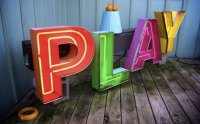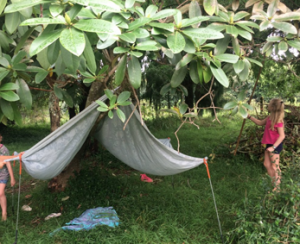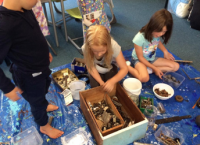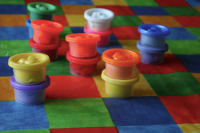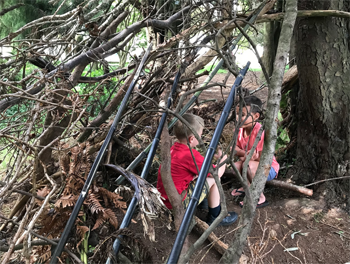Learning through play is gaining momentum in New Zealand schools as teachers recognise the opportunity for students to develop key competencies, values, and knowledge through play-based learning. This blog explores what learning through play is all about and shares how some schools are designing a play-based curriculum.
Photo by eschipul on Foter.com / CC BY-SA
What is learning through play?
Learning through play is a pedagogical approach where play is the valued mode of learning – where children can explore, experiment, discover, and solve problems in imaginative and playful ways. Learning through play is also called play-based learning.
Learning through play forms the pedagogical foundation of Te Whāriki, the early childhood curriculum. It is also becoming a more common approach to learning in junior primary classrooms with some schools trialling play-based learning at middle and senior primary level.
Learning through play is distinct from the broader concept of play. Learning is not necessary for an activity to be perceived as play, but learning is fundamental to learning through play.
An effective learning through play programme enables children to engage in self directed play that is internally motivated. Teachers can support children in play-based learning by providing an enabling environment and sensitive interaction. There is a role for the teacher to discuss, embed and extend the learning with students.
What are the benefits of learning through play?
Learning through play can help schools realise the vision of The New Zealand Curriculum to develop confident, connected, actively involved, lifelong learners. Almost all of the values and key competencies in The New Zealand Curriculum can be developed through play-based learning. A range of learning areas can be explored with connections made across learning areas as well as to home practices and the wider world.
Learning through play also provides the opportunity to extend the use of Te Whāriki curriculum into early years schooling. New entrants teachers should be aware of the principles and strands of Te Whāriki and deliberately build on the foundations that have already been laid.
There is a growing body of evidence to suggest that learning through play brings numerous benefits to students’ learning and development.
-
Thinking skills
Play-based activities enable students to engage in flexible and higher-level thinking processes. These include inquiry processes of problem solving, analysing, evaluating, applying knowledge, innovation, and creativity.
-
Interpersonal skills
Play-based learning often requires interaction with others and gives students the opportunity to practice language development, cooperation, negotiation, leadership, empathy, active listening, and compromise.
-
Intrapersonal skills
Play contributes to a child’s sense of well-being and can support the development of intrapersonal skills such as self esteem, motivation, resilience, concentration, persistence, and time management.
-
Student agency and engagement
Play-based learning can encourage student agency and often results in deeper levels of student engagement in learning.
-
Smooth transitions to school
Schools that have adopted learning through play in junior classrooms report that new entrant students settle to school quickly because of improved continuity between school and early childhood education.
From Learning Through Play: A Review of the Evidence and New Entrant classrooms in the re-making
The role of the teacher
The role of the teacher is critical to a successful learning through play programme. Teaching practices that support effective play-based learning include:
- creating a classroom environment with diverse interest areas that offer rich play opportunities
- drawing on curriculum knowledge to recognise the learning within play
- building play opportunities around student’s prior knowledge and interests
- providing sufficient opportunities for students to engage in play
- participating in meaningful learning conversations with children that stretch their thinking
- understanding and supporting the development of specific skills and knowledge that students need
- facilitating social interactions.
“Playful learning is the magic that takes place when we meld a child’s sense of joy and wonder with thoughtfully planned learning experiences.”
Playful Learning: Develop Your Child's Sense of Joy and Wonder by Mariah Bruehl
School stories
These stories provide examples of ideas and approaches some schools are using to implement a play-based curriculum.
Junior primary example
Self directed play inspires rich learning
Student agency through self-directed, open-ended inquiry play is given full rein at St Paul’s Junior School in Nelson.
Middle primary example
Halswell School – Learning through play
In this series of videos, year 3–4 teacher Kate Bodger describes the evidence and collaborative practice that supports the learning through play programme at Halswell School.
Whole school example
Kamai School – Play-based learning
Kaimai principal Dane Robertson shares his findings about play-based learning and Kaimai School’s journey so far to put this into action.
Reflective questions/Ngā patai
- How does play-based learning benefit students’ development, engagement, and achievement?
- Do any ideas or approaches from the school stories appeal to you?
- How could you integrate opportunities for students to learn through play in your school curriculum?
Keen to explore more?
Facebook group – Learning through play
Join this Facebook group which is designed for teachers and other education professionals to discuss ideas, research, and practice of play in education with the goal of improving the educational experience of our tamariki.
Learning Through Play: A Review of the Evidence
This white paper summarises current evidence on the role and importance of children’s learning through play.
Play misunderstood: the divide between primary classroom
Sarah Aiono of Longworth Education explains that a successful play-based learning environment requires a level of skill by teachers.
Te Whāriki Online
This site offers information, resources, and support for early childhood teachers, educators, and kaiako working with Te Whāriki, the early learning curriculum in Aotearoa New Zealand.
Beginning a journey into play
Leslee Allen, principal of Kaurihohore School, shares key considerations for teachers who are interested in beginning a journey into play.
Exploring the connections between the NZC and Te Whāriki – Part 1
In this blog, the first of a two part series, we explore the connections between The New Zealand Curriculum and Te Whāriki to better support children’s learning as they transition from early childhood education into primary school.
Connections between the NZC and Te Whāriki – Part 2
In this blog, the second of a two part series, we continue to investigate the connections between The New Zealand Curriculum and Te Whāriki to better support children’s learning as they transition from early childhood education into primary school.

